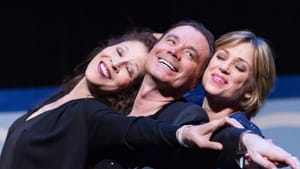Stay in the Loop
BSR publishes on a weekly schedule, with an email newsletter every Wednesday and Thursday morning. There’s no paywall, and subscribing is always free.
On thin ice?
Delaware Theatre Company presents Josh Ravetch's 'Go Figure: The Randy Gardner Story'

I was immediately intrigued by Go Figure: The Randy Gardner Story, because the celebrated figure skater "plays" himself in director Josh Ravetch's production. Theater artists occasionally act their stories; Susan Miller's My Left Breast comes to mind. But we seldom see nonactors performing their own stage biographies, though Philadelphia's Plays & Players premiered former Eagle Mike Boryla's autobiographical The Disappearing Quarterback in 2014.
For lifelong skating fans, Go Figure is a rare chance to glimpse the sport's real-life stars and backstage drama beyond Tonya and Nancy, especially since Gardner's pairs partner Tai Babilonia and Olympic royalty Dorothy Hamill make "special appearances," sitting in the audience until called upon to join the fun.
However, I was more intrigued by the prospect of a nonactor "acting" as himself. How does that work?
A generous approach
While focusing on Gardner's life story, Ravetch includes entertaining diversions, such as videos projected on a large screen. Among the visuals: a collection of skating pairs' most lurid '70s costumes, a Hamill hair-product commercial, montages of "America's sweethearts" and celebrities Babilonia dated, and other grainy video miscellany. But there’s also essential video of Gardner and Babilonia's 1979 world championship routine and other documentation of their career highs — alongside, bravely, their lows, such as their aborted 1980 Olympic performance.
There's no actual skating, of course. Gardner wears black slacks and an understated black sequined collarless shirt, indulging in some famous poses and a brief audience-interaction skating lesson. None of this feels like filler, however, because Gardner brings such enthusiasm, generously sharing credit with not only Babilonia and Hamill but the entire skating world.
While he doesn't shy away from discussing weighty life events, from the unusual circumstances of his birth and adoption to his parents' attempt to "cure" his sexuality through reparative therapy, Gardner doesn't linger in his story's darker moments. Go Figure celebrates skating, and life, with a breeziness that should feel natural.
Such a difficult pose
As Oscar Wilde said, "to be natural is such a very difficult pose to keep up," and that's where Gardner struggles. Good acting transcends the artificial situation of written lines absorbed by performers and spoken as their own with believably comfortable gestures, movement, and expression. Gardner's not there yet, but his efforts are sincere; his performance reminds me of how difficult acting can be, and how wondrous great acting is.
Wilde also said, "I love acting. It is so much more real than life." There's something powerfully brave about nonactor Gardner baring his soul despite sounding like he's reading from cue cards. It's not more real than life, but it is life, and its humble rawness paradoxically reveals Gardner's optimism, courage, and love of skating.
We only glimpse the personal costs of an athletic performance career. Ravetch — who also collaborated on solo stage shows with actors Carrie Fisher, Dick Van Dyke, Stefanie Powers, and Olympian Diana Nyad — skillfully understates Gardner's struggles, but the facts reveal an inspiring survivor.
No skating, no acting, little drama, yet an exciting and moving performance. Go figure.
What, When, Where
Go Figure: The Randy Gardner Story. Written and directed by Josh Ravetch. Through January 28, 2018, at the Delaware Theatre Company, 200 Water Street, Wilmington, Delaware. (302) 594-1100 or delawaretheatre.org.
Sign up for our newsletter
All of the week's new articles, all in one place. Sign up for the free weekly BSR newsletters, and don't miss a conversation.

 Mark Cofta
Mark Cofta